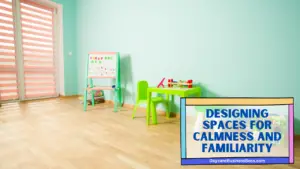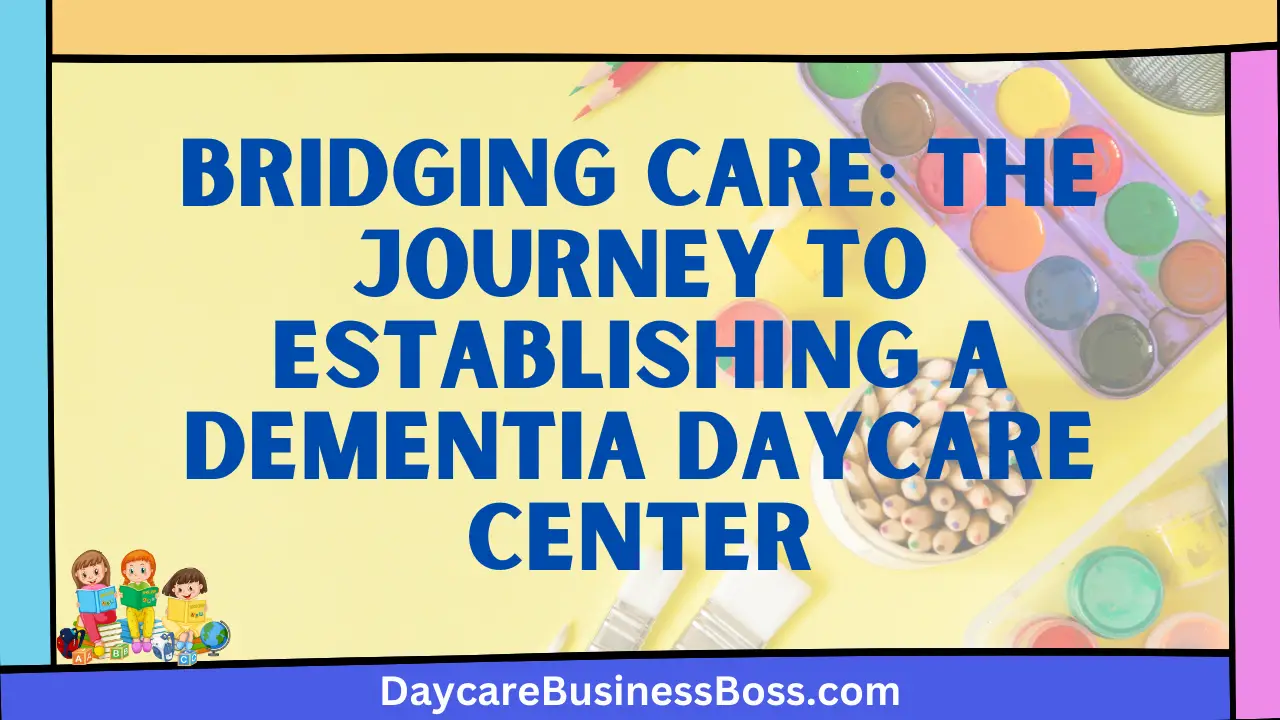Dementia is a major topic in our society, affecting not only those who have the disorder but also their families and carers. In the middle of this problem, the concept of a dementia daycare center arises as a beacon of hope, providing respite, engagement, and care for individuals directly affected as well as their dedicated support networks. Creating a dementia daycare facility entails more than just creating a physical space; it entails crafting a tapestry of empathy, expertise, and understanding.
To open a dementia daycare center, you should find a safe, accessible location, get licenses and follow health rules, design spaces to promote calmness and familiarity, hire dementia care specialists, schedule daily activities to engage attendees, work with healthcare providers, and engage families and train employees regularly.
This article digs into the complexities of constructing such a center, examining the stages, considerations, and commitments required in creating a sanctuary that nurtures the minds and spirits of dementia patients. As we go on this trip, we find the compassionate threads that serve as the cornerstone of a dementia daycare center, as well as the significant influence it may have on the lives it touches.
Finding a Suitable Location
The establishment of a dementia daycare facility is a multifaceted endeavor, with the first and most important step being the discovery of a suitable location. This critical decision builds the groundwork for the center’s growth since it has a substantial impact on both participant’s and their families’ experiences.
Several key variables must be considered when looking for the ideal place. The surroundings must be safe and free of potential risks that could affect the well-being of people with dementia. Equally important is the center’s accessibility, as it should be easily accessible to participants and their families. A prime site is close to public transportation, making it possible for those without private vehicles to attend easily.
Another important factor to consider is the ambiance of the chosen location. A calm place away from the hustle and bustle of city life is ideal. This tranquil setting supports the reduction of stress and anxiety, which are major issues for people with dementia. The center can establish a conducive environment for engaging activities and therapeutic encounters by limiting noise and distractions.
It is also critical to address the practicalities of access. Ample parking accommodates the needs of attendees and caregivers, allowing for smooth drop-offs and pickups. Following accessibility requirements guarantees that people with mobility issues can easily navigate the grounds.
Obtaining Licenses and Adhering to Health Regulations
When it comes to creating a dementia daycare center, licensing is a critical first step. This sophisticated process entails extensive contact with local regulatory authorities to develop a thorough understanding of the specific requirements and then obtain the necessary permits. The value of this undertaking cannot be emphasized, as it demonstrates the center’s dedication to working within a legal, accountable, and caring environment.
Health and safety regulations serve as the foundation for the center’s operations. The center ensures that its premises provide an environment that promotes the security and well-being of its members by scrupulously adhering to these requirements. Compliance is more than just a formality; it is a vow to create an environment in which people with dementia can thrive and receive the care they deserve.
Meeting inspection criteria consistently is a critical aspect of sustaining compliance. Regular inspections act as checkpoints, assessing the center’s compliance with set norms and highlighting opportunities for improvement. A strong sanitation routine, in addition to inspections, is required to avoid the spread of diseases. This protocol includes strict hygiene procedures, effective waste disposal, and the application of cleaning measures to protect participants’ health.
In this setting, fire safety cannot be overstated. Fire safety criteria, such as fire exits, emergency evacuation plans, and the installation of necessary firefighting equipment, must be strictly followed by the center. These safeguards reassure participants and their families that every precaution possible has been taken to ensure their safety.
Designing Spaces for Calmness and Familiarity

Creating an atmosphere that promotes the well-being of people with dementia necessitates careful consideration of their requirements and sensitivities. The design of the dementia daycare center is crucial in establishing an environment that fosters comfort and security, with the potential to significantly improve participants’ entire experience.
The art of design, in which every element is coordinated to elicit a sense of comfort and tranquility, is central to this quest. Color palettes that are warm and calming add to an appealing ambiance, wrapping participants in an ambiance that fosters relaxation and emotional ease. The strategic layout of areas is critical for preventing clutter and providing clean and easy-to-navigate pathways. This not only improves safety but also lowers possible causes of confusion for dementia patients.
The incorporation of familiar objects into the environment is a potent strategy for eliciting memories and emotions. Personal artifacts, photographs, and nostalgic decorations can foster ties with the past, providing participants with a sense of continuity and identity. These aspects serve as touchstones, anchoring people in the present while providing peeks into their history.
The addition of a sensory garden or specific relaxing zones enhances the design of the center. The scents, textures, and colors of nature provide a relaxing and calming experience in a sensory garden, which activates numerous senses. These areas provide a calm respite, allowing participants to interact with nature and enjoy moments of peace away from the hustle and bustle of daily life.
Read more about: Room to Blossom: The Power of Well-Designed Daycare Floor Plans
Hiring Dementia Care Specialists
The quality of a dementia daycare center’s employees is inextricably linked to its growth. Hiring skilled dementia care professionals is more than a formality; it is a critical step in building an environment that promotes the physical and emotional well-being of the center’s visitors.
Identifying people with the qualifications and expertise needed to traverse the complex environment of dementia care is a significant criterion in this effort. Candidates with applicable certifications or degrees in gerontology, nursing, social work, or other related professions are preferred. These qualifications demonstrate a candidate’s attention to understanding the unique issues posed by dementia and to improving their competence in this sector.
Experience, especially in the context of dementia care, is priceless. Look for those who have a documented track record of working with dementia patients. This experience teaches students effective communication tactics, behavioral control strategies, and the complexities of providing person-centered care.
Compassion is an essential quality that should not be disregarded. Dementia care specialists must approach their roles with empathy, compassion, and a thorough awareness of the emotional toll that dementia may exact on both participants and their families. A compassionate approach not only improves care quality but also fosters a nurturing and supportive environment.
Dementia care specialists’ responsibilities go beyond basic personal care. They are critical in involving individuals in activities that promote cognitive function and develop social bonds. These activities are carefully designed to accommodate the attendees’ different interests and skills. Specialists help participants’ overall quality of life by providing chances for artistic expression, intellectual engagement, and social contact.
Scheduling Engaging Daily Activities
Creating a well-structured daily routine at a dementia daycare facility is more than simply a scheduling exercise; it is a basic strategy for improving the lives of its participants. A properly tailored routine full of different and interesting activities has the potential to improve the cognitive, emotional, and social components of dementia patients.
The foundation of such a routine is variety. Plan activities that cater to a wide range of interests and abilities, while respecting the individuality of each participant. Music therapy, which is known for its ability to elicit emotions and memories, can be an effective instrument for emotional connection and stimulation. Art lessons promote self-expression and creativity by enabling participants to communicate visually. Reminiscence sessions, in which people share their life stories and memories, not only help people connect but also help people preserve cognitive function by engaging the brain’s recall systems.
Physical exercises adapted to the capacities of the guests help to general well-being. Gentle motions and gentle workouts can help to improve mobility, circulation, and mood. Beyond the physiological benefits, these activities foster a sense of self-worth, which is especially important for people with dementia who may experience frustration or disorientation.
The significance of a well-balanced timetable cannot be overstated. A well-structured regimen not only helps to sustain cognitive function but also instills a sense of purpose and accomplishment. Predictable activities and predictable timings create a familiar framework, which reduces anxiety and makes people feel more at ease in their surroundings.
Collaborating with Healthcare Providers

A collaborative partnership with healthcare practitioners is essential in the management of a dementia daycare center. This strategic alliance is much more than a formality; it is a dynamic effort that has a substantial impact on the guests’ overall well-being.
The establishment of relationships with a variety of local medical professionals, including geriatricians, nurses, therapists, and other dementia care specialists, is critical to this collaboration. These healthcare professionals provide their knowledge to ensure that participants’ physical and mental health requirements are met completely.
Regular health screenings, enabled by these medical partners, are an essential component of the center’s work. These assessments not only monitor the health of participants but also aid in the early discovery and intervention of any emergent medical difficulties. Medication management, which can be difficult for people with dementia, benefits from the assistance of healthcare experts who ensure that prescriptions are followed and that any potential interactions are avoided.
Access to expert care is another priceless benefit of our relationship. Dementia presents distinct issues that necessitate customized solutions. Participants can obtain therapies and interventions tailored to their individual cognitive and emotional requirements with the help of healthcare specialists. This multidisciplinary approach improves service quality and provides participants with a comprehensive support system.
Communication routes with healthcare providers must be effective. Open lines of communication guarantee that the employees at the center can connect their care efforts with medical recommendations. Updates on participants’ progress, changes in medical condition, and any emergent concerns can be relayed in real-time, allowing for a more integrated approach to care.
Read more about: Aging with Grace: How to Begin Your Own Senior Daycare Center
Engaging Families and Providing Regular Training
Building strong bonds with the families of dementia daycare center participants is a critical component that goes beyond simple caregiving—it’s a commitment to offering full assistance to both those with dementia and their loved ones.
The foundation of this bond is regular communication. Keeping families updated about their loved ones’ activities, progress, and well-being fosters trust and transparency. Regular updates on daily routines, milestones, and any concerns foster a partnership between the center and the families, ensuring that everyone is on the same page and working in the best interests of the participants.
Caregivers can share their experiences, challenges, and insights through family support groups and instructional programs. Caring for someone with dementia can be emotionally draining, and these resources offer a haven for families to seek solace and learn from one another. Caregivers who attend educational programs gain an understanding of dementia, appropriate communication skills, and coping processes, allowing them to provide better care while also caring for their well-being.
Employees must get continual training. The dementia care landscape is continually changing, with new studies and treatments developing. Regular training sessions provide personnel with the most recent caregiving methodologies, ensuring that they are up to date on best practices. Sensitivity to the special needs of people with dementia is essential, and ongoing training develops an environment of empathy and understanding.
Frequently Asked Questions

What elements should I take into account while selecting a location for a dementia daycare center?
The location of a dementia daycare center is critical to its effectiveness. Consider things like accessibility, safety, and tranquility. Look for a location that is convenient for both participants and their families, with plenty of parking and proximity to public transit. To create a serene mood, make sure the surroundings are quiet and free of noise and distractions. Compliance with accessibility rules is critical for accommodating those with mobility issues.
How can I ensure that my dementia daycare center complies with health and safety regulations?
It is critical to obtain the proper licenses and permissions from local authorities to guarantee your dementia daycare facility adheres to health and safety requirements. Collaborate closely with regulatory agencies to understand your region’s special requirements. To ensure compliance, implement regular cleanliness practices, maintain fire safety measures, and conduct routine inspections. Keeping accurate records of these activities displays your dedication to keeping participants safe and secure.
What activities should I include in a dementia childcare center’s daily schedule?
Creating a well-rounded daily schedule is essential for engaging people with dementia. Plan a variety of activities that will appeal to a wide range of interests and skills. Include music therapy, art classes, light physical activity, and remembrance activities. These activities promote not only cognitive performance but also social contact and a sense of achievement. Personalized activities that are meaningful to individuals’ past experiences might elicit happy memories and feelings, improving their general well-being.
To learn more on how to start your own daycare checkout my startup documents here.
The information provided by DaycareBusinessBoss.com (“The Site”) is for general informational purposes only. All information on the Site is provided in good faith, however, we make no representation or warranty of any kind, express or implied, regarding the accuracy, adequacy, validity, reliability, availability or completeness of any information on the Site. Under no circumstance shall we have any liability to you for any loss or damage of any kind incurred as a result of the use of the Site or Reliance on any information provided on the Site. Your use of the Site and your reliance on any information on the Site is solely at your own risk.
This blog post is for educational purposes only and does not constitute legal advice. Please consult a legal expert to address your specific needs. Terms and Conditions. (https://daycarebusinessboss.com/terms-conditions/)

Meet Shawn Chun: Entrepreneur and Childcare Business Fan.
I’m a happy individual who happens to be an entrepreneur. I have owned several types of businesses in my life from a coffee shop to an import and export business to an online review business plus a few more and now I create online daycare business resources for those interested in starting new ventures. It’s demanding work but I love it. I do it for those passionate about their business and their goals. That’s why when I meet a childcare business owner, I see myself. I know how hard the struggle is to retain clients, find good employees and keep the business growing all while trying to stay competitive.
That’s why I created Daycare Business Boss: I want to help childcare business owners like you build a thriving business that brings you endless joy and supports your ideal lifestyle.


